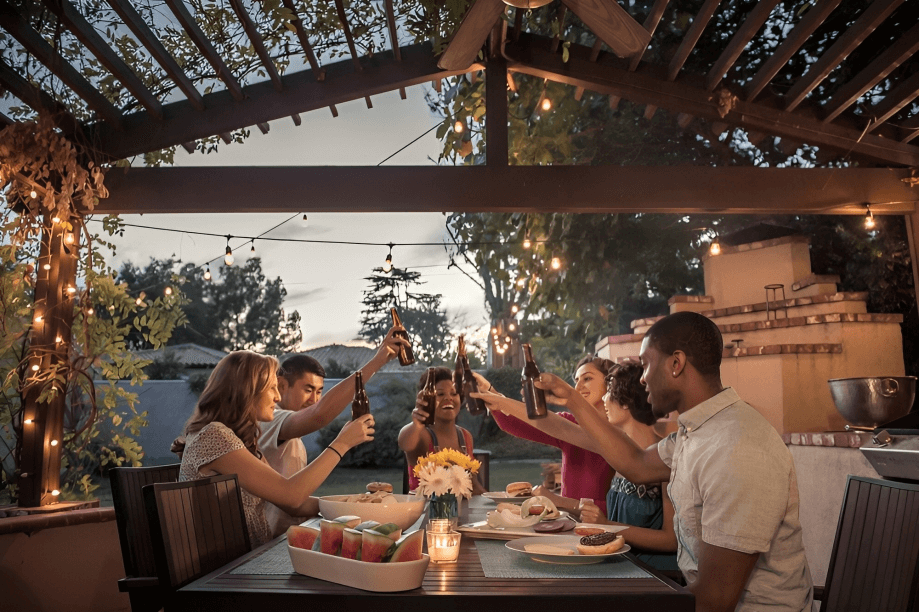
Hosting guests at the holiday : Hospitality is a fundamental human trait that transcends cultural and geographical boundaries. Whether you are hosting friends, family, or even strangers, making your guests feel welcome and appreciated is a universal gesture of kindness. A warm and inviting atmosphere not only enhances the overall experience for your guests but also strengthens your relationships. In this essay, we will explore the art of hospitality and provide a comprehensive guide on how to make your visitors feel genuinely welcome and appreciated.
In the fast-paced world we live in, the art of making guests feel welcome and appreciated holds immense value. It strengthens bonds, fosters new connections, and brings joy to both hosts and visitors. By understanding the foundations of hospitality, preparing your space with care, offering warm and inviting communication, delighting your guests with culinary experiences, showering them with thoughtful gestures, providing engaging activities, and expressing gratitude, you can become a master of hospitality. Remember, the essence of hospitality lies in the sincerity of your efforts, and the memories you create will endure long after your visitorshave left. So, embrace the art of making others feel at home, and you will reap the rewards of enriched relationships and cherished moments.
I. The Foundation of Hospitality
A. Understanding the Importance of Hospitality
- Hospitality as a cultural cornerstone
- The significance of making guests feel valued
- Creating lasting memories through genuine hospitality
B. Cultivating a Hospitality Mindset
- Empathy and its role in hosting
- Treating guests as extensions of your family
- Personal growth through hosting
2. Preparing Your Space
A. Cleanliness and Organization
- The importance of a clean environment
- Organizing for efficiency and comfort
- Attention to details in guest spaces
B. Personal Touches
- Welcoming decorations and ambiance
- Customizing spaces to suit your guests’ preferences
- Thoughtful amenities and supplies
3. Warm and Inviting Communication
A. The Power of a Warm Greeting
- The impact of the first impression
- Personalized greetings based on guest preferences
- Body language and tone of voice
B. Effective Communication
- Actively listening to your guests
- Responding to their needs and requests promptly
- Offering assistance and recommendations
4. Culinary Delights
A. Preparing Delicious Food
- Catering to dietary preferences and restrictions
- Experimenting with local and international cuisine
- The joy of home-cooked meals
B. Dining Experience
- Setting the table with care and style
- Engaging in meaningful conversations during meals
- Desserts and parting gifts as a sweet conclusion
5. Thoughtful Gestures
A. Personalized Welcome Gifts
- The impact of a thoughtful welcome gift
- Ideas for welcome gifts tailored to your guests
- The element of surprise and delight
B. Offering Comfort
- Providing comfortable sleeping arrangements
- Preparing spaces for relaxation and entertainment
- Ensuring safety and security
6. Activities and Entertainment
A. Tailored Experiences
- Planning activities based on guests’ interests
- Providing options for leisure and adventure
- Balancing relaxation and excitement
B. The Art of Hosting
- Creating opportunities for social interaction
- Hosting game nights, movie marathons, or cultural experiences
- Encouraging participation and inclusivity
7. Expressing Gratitude
A. Farewell Sentiments
- Expressing appreciation for your guests’ presence
- Reflecting on memorable moments together
- Inviting guests to return
B. Follow-up and Staying Connected
- Sending thank-you notes or emails
- Keeping in touch and nurturing relationships
- Inviting guests to reciprocate your hospitality
8. Handling Special Situations
A. Handling Dietary Restrictions and Allergies
- Inquiring about dietary restrictions in advance
- Preparing alternative options that are equally delicious
- Ensuring cross-contamination does not occur
B. Accommodating Children and Pets
- Creating a child-friendly environment with toys and activities
- Offering pet-friendly amenities and spaces
- Safety considerations for both children and pets
C. Dealing with Unexpected Issues
- Remaining calm and flexible in challenging situations
- Problem-solving and finding solutions quickly
- Keeping guests informed and involved in the resolution process
9. Creating a Welcoming Environment
A. The Role of Home Décor
- Incorporating elements that make your home feel cozy
- Using colors and lighting to set the right mood
- The significance of comfortable furniture and bedding
B. Adding Personal Touches
- Displaying family photos and personal memorabilia
- Showcasing your interests and hobbies
- Encouraging guests to share their stories and experiences
10. Cultural Sensitivity
A. Understanding Cultural Differences
- Researching your guests’ cultural backgrounds
- Avoiding cultural stereotypes and assumptions
- Embracing diversity and inclusivity
B. Celebrating Special Occasions
- Acknowledging and respecting your guests’ traditions and holidays
- Incorporating cultural elements into your hospitality
- The joy of learning from different cultural perspectives
11. Sustainability and Eco-Friendly Hosting
A. Reducing Your Environmental Impact
- Implementing eco-friendly practices in your hosting routine
- Using sustainable and biodegradable products
- Encouraging guests to adopt green habits during their stay
B. Supporting Local Communities
- Sourcing locally produced goods and services
- Promoting local artisans and businesses
- Enhancing the cultural experience for your guests
12. Continuous Improvement
A. Seeking Feedback
- Encouraging honest feedback from your guests
- Using feedback to identify areas for improvement
- Demonstrating a commitment to ongoing growth
B. Learning from Others
- Sharing experiences and knowledge with fellow hosts
- Attending workshops and hospitality courses
- Staying updated on industry trends and best practices
Conclusion
The art of making guests feel welcome and appreciated is a multifaceted endeavor that encompasses a wide range of considerations and actions. From the foundational aspects of hospitality to the finer details of creating a warm and inviting environment, every element plays a crucial role in ensuring a memorable and enjoyable experience for your guests.
By continuously honing your hosting skills, adapting to the needs and preferences of your guests, and embracing cultural sensitivity and sustainability, you can elevate your hospitality to an art form. Ultimately, the lasting relationships you forge and the cherished memories you create will not only enrich your life but also leave a positive impact on all those who have the privilege of being your guests.
So, embrace the role of a gracious host, and let your genuine warmth and hospitality shine through in every aspect of your interactions with your guests. In doing so, you will not only make your guests feel welcome and appreciated but also leave a lasting impression that lingers in their hearts and minds for years to come.
Certainly, here are some frequently asked questions related to the article “How to Make Your Guests Feel Welcome and Appreciated” and their answers:
Q1: Why is hospitality important when hosting guests?
A1: Hospitality is essential because it creates a welcoming and comfortable environment for your guests. It shows that you value their presence and are willing to go the extra mile to make their stay enjoyable. It strengthens relationships and leaves a lasting positive impression.
Q2: What are some simple ways to make my guests feel welcome in my home?
A2: Simple gestures like a warm greeting, keeping your space clean and organized, and offering refreshments upon arrival can go a long way. Personalized welcome gifts and a comfortable sleeping arrangement are also great ways to make guests feel at home.
Q3: How can I cater to guests with dietary restrictions and allergies?
A3: It’s essential to ask your guests about their dietary restrictions in advance. You can then prepare alternative menu options that cater to their needs, ensuring they have a delightful dining experience. Cross-contamination should be avoided to prevent allergic reactions.
Q4: What if I encounter unexpected issues during my guests’ stay?
A4: Staying calm and flexible is key when facing unexpected challenges. Communication is crucial; keep your guests informed and involved in finding solutions. Being proactive and accommodating can help turn a challenging situation into a positive experience.
Q5: How can I celebrate cultural diversity when hosting guests from various backgrounds?
A5: To celebrate cultural diversity, research your visitors’ backgrounds and traditions. Embrace their customs and holidays, incorporate cultural elements into your hospitality, and be respectful of their beliefs and practices. It’s an opportunity to learn and share experiences.
Q6: How can I make my home more eco-friendly when hosting guests?
A6: Reducing your environmental impact can involve using sustainable products, conserving energy and water, and encouraging guests to adopt eco-friendly habits during their stay. Supporting local businesses and sourcing locally-produced goods can also contribute to sustainability.
Q7: What can I do to continuously improve my hosting skills?
A7: Seek feedback from your guests to identify areas for improvement. Learn from other experienced hosts, attend workshops, and stay updated on industry trends. The key is a commitment to ongoing growth and refinement of your hospitality skills.
Q8: Is it necessary to offer a parting gift or express gratitude when guests leave?
A8: While it’s not mandatory, offering a parting gift or expressing gratitude as guests depart is a thoughtful gesture that can leave a positive lasting impression. It’s a way to show appreciation for their visit and create a memorable farewell.
These frequently asked questions and their corresponding answers provide additional insights into the art of hospitality and how to ensure your visitors feel genuinely welcome and appreciated during their stay.


